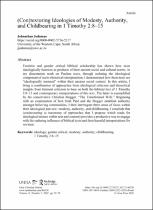| dc.contributor.author | Jodamus, Johnathan | |
| dc.date.accessioned | 2023-03-17T12:57:30Z | |
| dc.date.available | 2023-03-17T12:57:30Z | |
| dc.date.issued | 2022 | |
| dc.identifier.citation | Jodamus, J. (2022). (Con)texturing ideologies of modesty, authority, and childbearing in 1 Timothy 2:8–15. Journal of Early Christian History, 12(3), 59–78. https://doi.org/10.1080/2222582X.2022.2146520 | en_US |
| dc.identifier.issn | 2222-582X | |
| dc.identifier.uri | https://doi.org/10.1080/2222582X.2022.2146520 | |
| dc.identifier.uri | http://hdl.handle.net/10566/8618 | |
| dc.description.abstract | Feminist and gender critical biblical scholarship hasshown how texts ideologically function as products of their ancient social and cultural norms. In my dissertation work on Pauline texts, through isolating the ideological component of socio-rhetorical-interpretation, I demonstrated how these texts are “ideologically textured”within their ancient social context. In this article, I bring a combination of approaches from ideological criticism and theoretical insights from feminist criticism to bear on both the biblical text of 1 Timothy 2:8–15 and contemporary interpretations of this text. The latter is exemplified by the conservative Christian blogger, “The Transformed Wife.”Beginning with an examination of how both Paul and the blogger establish authority amongst believing communities, I then interrogate three areas of focus within their ideological purview: modesty, authority,and childbearing. | en_US |
| dc.language.iso | en | en_US |
| dc.publisher | Taylor and Francis Group | en_US |
| dc.subject | Gender | en_US |
| dc.subject | Religion | en_US |
| dc.subject | Theology | en_US |
| dc.subject | Feminism | en_US |
| dc.subject | Culture | en_US |
| dc.title | (Con)texturing ideologies of modesty, authority, and childbearing in 1 Timothy 2:8–15 | en_US |
| dc.type | Article | en_US |

